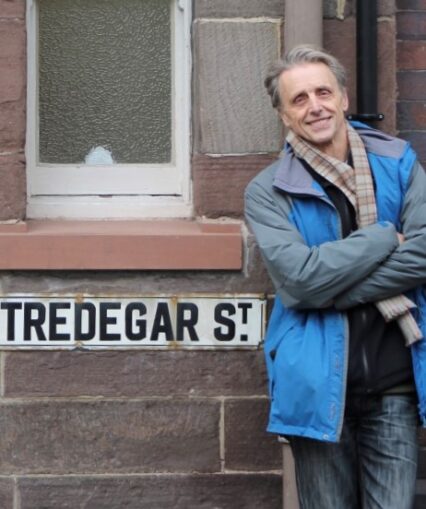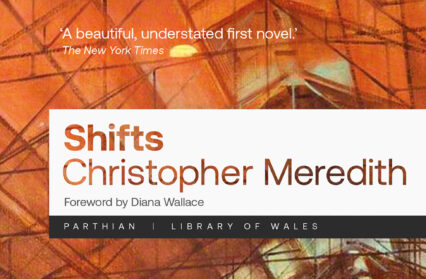As Shifts by Christopher Meredith becomes number 53 in the Library of Wales series, Professor Diana Wallace introduces the new edition of this classic novel of Welsh literature.
Shifts is a novel of the decline of industry and the battle of a working-class community to remain true to itself in the valleys of south Wales during the 1980s. A funny, lyrical and poignant lament of the expectations and realities of life framed with love and driven with a desire for a better future.
“Given his versatility as both poet and novelist and the ambitious breadth of his concerns, it is extraordinary that Meredith’s work is not yet better known outside Wales. He is a major writer whose work speaks directly, and urgently, to universal themes and concerns precisely because it is grounded in the specificity of a particular time and place. Shifts is a novel which helps us to know where we are now, and why, in relation to many complex issues: history, time, work, politics, love, betrayal and grief. It is also witty, compassionate, and brilliantly readable. If you don’t know Meredith’s writing yet, this is a good place to start.” Professor Diana Wallace.
Widely acknowledged as the classic novel of de-industrialisation in Wales, Shifts is a far funnier, and stranger, book than that rather dry description might suggest. From the unsettling opening sentence – ‘O clocked off at exactly half past three’ – we are in a novel which combines closely-observed realism with a tightly-woven, but lightly-worn, pattern of imagery and symbolism. Christopher Meredith is an accomplished poet as well as a novelist and one of the great pleasures of Shifts is his playful dexterity with language. Just one of an exceptional range of linguistic registers in the novel, the south Wales valleys dialect spoken by his characters (‘Hiya butt. How be? A’right butty. Owzigoin? No’ bâd mun’) becomes a rhythmic, even poetic, expression of the specificity of a people and a place. When he began writing Shifts, Meredith has said that he ‘wasn’t even entirely sure if it was a novel at first’. One way of thinking about this impressively assured debut novel is to regard it as a kind of big ‘poem’ where the textures of language itself are part of the world Meredith is (re)making.
Published in 1988 but set a decade earlier in 1977, Shifts is a novel concerned with history (rather than a historical novel) which looks back at a moment of radical change in south Wales. Set over just nine months, it follows the fortunes of four characters linked by their association with a steelworks, the closure of which will irrevocably alter their lives and the landscape they inhabit. Jack Priday is the returning ‘native’, back from Lancashire to find work and lodgings two valleys over from his old home and using his facility for puns and anecdotes to integrate himself into, and distance himself from, the community. His former schoolfriend, Keith Watkins, is
employed at the steel-plant but increasingly obsessed by local history. Judith, Keith’s wife, is bored by their marriage but unable to commit to either becoming pregnant or finding employment herself. And, finally, the strangely named ‘O’, or Rob (nicknamed ‘Snobs’ in school), is a marginalised figure at the steelworks, obsessive about routines such as counting the number of times he can re-use a Sunblest plastic bag for his lunch. His name suggests both clock time (‘o’clock’) and nothingness (‘zero’). Weaving together the personal and the political, the novel shifts deftly between these four points of view, engaging our sympathies even as it turns a sharp eye on the characters’ weaknesses. Each of them, like everyone else in the novel, is ‘just looking for a bearable way of living’ in a town where the options are narrowing.
The title itself is multi-layered. Most obviously, it refers to the shift-work which has dominated the lives of the steelworkers. Monotonous and often at odds with the workers’ own natural rhythms (working night shifts has ‘Put [Keith’s] body-clock wrong’), these shifts nevertheless structured a way of life which is being lost as the men are laid off. ‘“They’m on’y fucking rolling one shift mind, days regular five days a bastard week,”’ one steelworker expostulates, ‘“Three shifts a day it used to be. Three shifts a fucking day seven days a week […] End of a shift you ’ouldn’ know whether you was coming or bastard going.”’ This mixture of resentment and loss reflects the ambivalent status of work in our lives: ‘the psychology of the thing’s complex, built on a paradox,’ Meredith has said of Shifts, ‘that your job is both what you are and what destroys you’. On a macro-level, the title also indicates the major historical ‘shifts’ taking place, which the characters for the most part only dimly recognise. The process of de-industrialisation, over which they have no control, up-ends traditional gender roles (the new jobs opening up in the marshmallow factory are primarily for women) and leaves the community in a state of limbo and paralysis.
The history of Welsh culture, Raymond Williams has argued, is marked by ‘a broken series of radical shifts’ within which there are certain social and linguistic continuities’. It is these ‘shifts’, as well as the continuities, which Meredith is tracing in the novel. While Jack presents himself as driven by the ‘biological imperative’, and Judith seems to look to the men around her for meaning, Keith turns to local history to try to make sense of his place in the world. From traces such as place names and old buildings, he tries to re-imagine how the landscape was transformed when the English Samuel Moonlow built the first furnaces in the then densely wooded valley and kickstarted the processes of industrialisation. Thus Meredith connects the ‘shifts’ which mark the beginning and end of this particular historical cycle. Language is crucial here too. Unable to read or speak Welsh, Keith cannot interpret his own history although it is marked on the landscape in names like ‘Henfelin’ or ‘Ty Mister’. Listening to a university professor explain how the town has existed on many ‘frontiers’ – of rural and industrial, farmland and desert, moorland and dense forest – Keith recognises that these are ‘Huge ideas’. Likewise, Meredith’s novel deals with ‘huge ideas’ but expressed through language, symbolism and imagery grounded in the ordinary details of ordinary lives.
If Richard Llewellyn’s 1939 novel How Green Was My Valley is what Raymond Williams called the ‘export version of the Welsh industrial experience’, Shifts is an insider’s version. Born in Tredegar to a father who was a steelworker and former collier, and a mother who had been a domestic servant, Meredith grew up on the Cefn Golau estate. Newly built in the mid-1950s, this estate looks down on the town from the edge of the open mountain which separates Tredegar from Rhymney. This landscape with its paradoxical combination of industrial and rural, tame and wild, was formative for the young Meredith and the setting of Shifts is in part a re-imagined version of this distinctive locale. As a child Meredith could go up onto the mountain, to where the nineteenth-century cholera graveyard which Keith explores in the novel is situated, or look, as Jack does, down into the town with its park and its rows of terraced houses, the factories to the north and the reclaimed pits to the south, and know that over the mountain to the east lay the ‘two miles tangle of steelworks’. Benefitting from the introduction of comprehensive education, Meredith went to Tredegar Comprehensive School and then on to University of Wales, Aberystwyth where he studied English and Philosophy. There he also learned to speak Welsh which he has described as ‘one of the most important things I’ve ever done.’

Before going to university Meredith had worked for three months at the British Steel Corporation’s Ebbw Vale steelworks where his father had worked in the coke ovens, later becoming a foreman and then a tinplate inspector. Meredith worked in the open hearth and enjoyed the sense of having a proper job, finding the place ‘anarchic’. But when, after graduating in 1976, he returned there as a shift worker in the hot mill, he found it very different. The steelworks was in the process of closing down and, as he put it, the job ‘doesn’t seem the same when you realise this is the rest of your life’. He left the steelworks to complete a Postgraduate Certificate in Education at University of Wales, Swansea, and then took up a post teaching English at Brecon High School.
It was while he was teaching that Meredith wrote and published his first two collections of poetry, This (1984) and Snaring Heaven (1990), as well as Shifts and his second novel, Griffri (1991). Written in spare moments over a period of four years, Shifts took shape against the background of the difficult political climate of the 1980s, including the aftermath of the 1979 referendum in which 79.74% voted against devolution for Wales, the right-wing government which came to power under Mrs Thatcher in May 1979, the now-forgotten steel strike of 1980, the Cardiff conspiracy trials of 1983, and the miners’ strike of 1984-5. This added up to what many felt was a climate of political fear and eroded civil liberties. The novel gave Meredith a way of addressing the history of his bro (region or country), broadening out from the more personal concerns of his poetry to the wider social and political processes which shape individuals, communities and countries.
Given his versatility as both poet and novelist and the ambitious
breadth of his concerns, it is extraordinary that Meredith’s work is not yet better known outside Wales. He is a major writer whose work speaks directly, and urgently, to universal themes and concerns precisely because it is grounded in the specificity of a particular time and place. Shifts is a novel which helps us to know where we are now, and why, in relation to many complex issues: history, time, work, politics, love, betrayal and grief. It is also witty, compassionate, and brilliantly readable. If you don’t know Meredith’s writing yet, this is a good place to start.
Diana Wallace is Professor of English Literature at the University of South Wales. She is the author of Christopher Meredith (University of Wales Press, 2018), Female Gothic Histories: Gender, History and the Gothic (University of Wales Press, 2013), The Woman’s Historical Novel: British Women Writers, 1900-2000 (Palgrave Macmillan, 2005) and Sisters and Rivals in British Women’s Fiction, 1914-39 (Macmillan, 2000). She has published widely on Welsh Writing in English and edited Margiad Evans’s Autobiography (1943) for Honno’s Welsh Women’s Classics series.
Shifts is available now from Parthian Books.
Christopher Meredith is an award-winning novelist, poet and translator. His first novel, Shifts, was published to critical acclaim in 1988. He has broadcast on radio and TV and given readings and talks all round Britain as well as in the Czech Republic, Egypt, Estonia, France, Germany, Finland, Ireland, Slovenia and the USA. Born and brought up in Tredegar and now living in Brecon, he has been a steelworker, a schoolteacher and a university professor.












